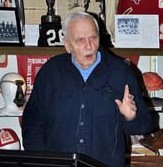FORMER SEYMOUR MAN SAW A LOT OF HISTORY
 “Bud” McBain relates war stories at the Seymour Historical Society annual meeting on Saturday, April 20. - Photo by Rick Cohler
“Bud” McBain relates war stories at the Seymour Historical Society annual meeting on Saturday, April 20. - Photo by Rick Cohler
By Rick Cohler, editor
Roland “Bud” McBain credits his Seymour High School football coach Paul Loftus, in part, for his long career first in helping coordinate European press coverage during World War II, and his long career as a broadcaster.
“Paul Loftus was the football coach and he said ‘learn to type, learn to type. Very few in the military can type and there’s great demand for guys who can type. And if you’re really smart, you will take shorthand.’ So, I had to sit with all girls and learn shorthand. It really helped.
When McBain graduated in 1942, he enrolled at Lawrence College in Appleton with a promise from the Army he could stay in college for a year if he enlisted in the Enlisted Reserve Corps. “I knew the Army wouldn’t stand for that so I was off to basic training by the spring of ‘43,” McBain recalled.
After basic training, McBain was sent to Fort Ord, California, where his typing and shorthand skills, along with his interest in journalism, landed him a spot in the 72nd Publicity Service Battalion which serviced all the reporters, broadcasters across Europe.
“When I got overseas all of a sudden, bang, I went down to a place where they were training the war correspondents and the people from UPI and the AP,” McBain said. “We provided them with all of the transmission facilities to New York and we ran the press camps all across Europe.”
“We operated Radio Luxembourg where we had direct links with New York.
“When we got there we thought the Germans were going to blow it up.”
Radio Luxembourg broadcast to all of Europe. The Germans were ready to blow it up and told the engineers to break the final-stage tubes to disable the station.
“What the Germans didn’t know was the chief engineer had hidden the tubes under floorboards of the post office,” McBain said. The Germans pulled out and the engineer put them back in and we were back on the air.”
Looking back on his career, McBain said working in news was all he ever wanted to do.
“I ended up after the war working for NBC in New York because I had so many contacts with all the broadcasters overseas,” McBain recalled.
After a period working for NBC and The Voice of America, McBain missed the Badger state and took a radio news job in Oshkosh where he remembers covering the Ed Gein story in the late 1950s.
“Our office lady at the radio station’s old boyfriend was the district attorney in Wautoma,” McBain said. “You had people there from NBC, the BBC, all waiting to get in and he’d say ‘Come on in Bud.’ I’d have the story before any of those people.”
Journalism has changed a lot since McBain was in the service and the years of local radio news. “Broadcast radio is not fun anymore,” McBain said. “We used to have fun. I’d be down at the courthouse in the morning, all the sheriff’s stuff, all the accidents. They don’t do it anymore. Local news is not covered much. We covered everything. On top of that I wrote an editorial every day and I did a talk show for 20 years.”
McBain recalled the battle for news between radio and the newspaper.
“I can understand,” McBain said. “We beat them all the time. Every day I would get done at the courthouse about 11:30. I’d be writing like crazy. I couldn’t type it up, I had to use my notes. I got so I could read all my scribbling, it sounded like I knew what I was doing. Some times I didn’t.
“I couldn’t make out all the names, so I would call the Appleton Post-Crescent, give them the stories from Oshkosh, call the UPI in Milwaukee, give them the story from up here, then I’d race for the station with my notes and do a newscast. When I couldn’t get there in time we had a microphone and amp at in the sheriff’s private office and I’d do it from his windowsill.”
McBain was the guest speaker at the Seymour Historical Society Annual Meeting on Saturday, April 20. He now lives in Pickerel.